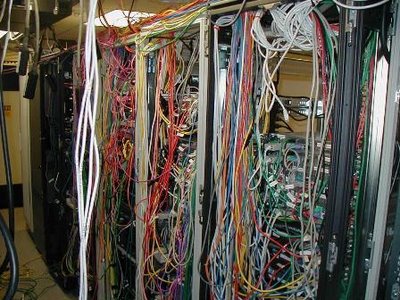
In The Beginning
Jon Postel, a computer science professor at the University of Southern California, was the main person having oversight of the Internet according to this article at Foreign Affairs.org. Working during the 1960s as a graduate student, he was one of a few engineers responsible for the internet.
Until 1998 he managed it for the Department of Defense’s Advanced Research Project Agency, which was responsible for the internet’s early development.
Postel decided who should operate a country-code domain. National address suffixes were allocated to private individuals rather than government because the Internet was so new that there was usually no national organization to hand a suffix to.
“Besides, governments, and particularly their monopoly telecom carriers, more often hindered communications development than helped it.”
It became clear to officials in the United States and elsewhere by the mid-1990s, that the Internet could no longer be run by a single individual.
“After a bitter series of negotiations among the business community, governments, and nongovernmental organizations worldwide, the Clinton administration helped broker a compromise and established ICANN in 1998. Because the United States' hands-off approach had allowed the Internet to flourish, it seemed appropriate that the new organization be based in the private sector. This would make it more responsive, more flexible, and less prone to bureaucratic and political squabbling. The negotiations were so tense that Postel suffered a heart attack as they were ending and never lived to see the birth of the successor organization he was instrumental in creating.”
US Leads Battle for Control
By 2004 other nations were calling for a new arrangement which would lessen the US control over the internet.
Foreign Affairs.org reveals:
“… in November 2004 UN Secretary-General Kofi Annan appointed a 40-person working group to address questions of Internet governance. Washington had planned to grant ICANN autonomy from its oversight in 2006. But the more other countries clamored for power, the more the United States reconsidered its policy of relinquishing control. Ultimately, it came down to national interest: Washington, with so much at stake in the Internet's continuing to function as it had, decided it was not prepared to risk any changes. So, as the UN working group was preparing to release its report (which, unsurprisingly, favored transferring authority over the Internet to the UN), the U.S. government made a preemptive strike.”
In this article from C-Net News they discuss this preemptive strike:
“The Bush administration announced Thursday that the U.S. government will not hand over control of the Internet to any other organization”
“The new principles, outlined by Assistant Commerce Secretary Michael Gallagher, say the U.S. government will ‘maintain its historic role in authorizing changes or modifications to the authoritative root zone file.’ In addition, the principles say, the U.S. government will continue to maintain ‘oversight’ of ICANN and prevent its ‘focus’ from straying from technical coordination.”
US Fearful of Relinquishing Control
This year, in a July meeting of the U.S. Department of Commerce, fears were expressed over relaxing US control over ICANN.
This report from Information Week reveals their concerns:
“At a U.S. Department of Commerce (DoC) hearing on Wednesday to assess whether the Internet's Domain Name System (DNS) should be handed over to the private sector, most panelists indicated a preference for continued U.S. government involvement in the management of the Net.
“‘In terms of realistic alternatives, we think it's the best of some potentially unappealing options,’ said panelist David McGuire, director of communications for the Center for Democracy and Technology, a non-profit Internet advocacy group.
“Such ‘unappealing options’ were raised last November, at the United Nations-sponsored World Summit on the Information Society in Tunisia, when representatives of some of the non-democratic governments in attendance such as Cuba, China, Iran, and Syria pressed for greater say in the administration of the Internet.
“In a report last summer, the U.N.'s Working Group on Internet Governance argued that ‘no single government should have a pre-eminent role in relation to international Internet governance.’
“Such sentiments prompted three U.S. congressmen—Rick Boucher, D-Va.; John Doolittle, R-Calif.; and Bob Goodlatte, R-Va.—to introduce a non-binding House resolution last October to keep the DNS servers under the control of the not-for-profit Internet Corporation for Assigned Numbers and Names (ICANN) and the DoC.
“In a far-fetched warning on his Website, Congressman Goodlatte raised the possibility of U.N. soldiers surrounding ICANN's office in Marina del Rey, Calif., to wrest control of the Internet and turn it over ‘to the infamous international bureaucracy of the U.N.’”
The Even Bigger Issue – Direct Government Control
Law Enforcement
One form of control currently being sought is for the Internet Service Providers (ISPs) to track and record internet usage.
In this USA Today story as presented by Raw Story we find that under a 1996 federal law called the Electronic Communication Transactional Records Act:
“… Internet providers to retain any ‘record’ in their possession for 90 days ‘upon the request of a governmental entity.’
“In addition, Internet providers are required by another federal law to report child pornography sightings to the National Center for Missing and Exploited Children, which is in turn charged with forwarding that report to the appropriate police agency.”
But the Bush administration wants even more:
“FBI Director Robert Mueller on Tuesday called on Internet service providers to record their customers’ online activities, a move that anticipates a fierce debate over privacy and law enforcement in Washington next year.”
In keeping with the Bush administration mantra of terrorism, Mueller had this to say at a speech to the International Association of Chiefs of Police conference in Boston:
"Terrorists coordinate their plans cloaked in the anonymity of the Internet, as do violent sexual predators prowling chat rooms.
"All too often, we find that before we can catch these offenders, Internet service providers have unwittingly deleted the very records that would help us identify these offenders and protect future victims. We must find a balance between the legitimate need for privacy and law enforcement's clear need for access."
And Attorney General Alberto Gonzales told Congress last month that "this is a national problem that requires federal legislation."
According to this Raw Story report, Michael Chertoff also was on hand to play the terror card:
“‘We now have a capability of someone to radicalize themselves over the Internet,’ Chertoff said on the sidelines of a meeting of International Association of the Chiefs of Police.
“‘They can train themselves over the Internet. They never have to necessarily go to the training camp or speak with anybody else and that diffusion of a combination of hatred and technical skills in things like bomb-making is a dangerous combination,’ Chertoff said. ‘Those are the kind of terrorists that we may not be able to detect with spies and satellites.’”
Also in the USA Today article we learn:
“Law enforcement groups claim that by the time they contact Internet service providers, customers’ records may be deleted in the routine course of business.”
But then again a more rational thinking is noted:
“Industry representatives, however, say that if police respond to tips promptly instead of dawdling, it would be difficult to imagine any investigation that would be imperiled.”
Also noted is the controversy involved:
“Justice Department officials admit privately that data retention legislation is controversial enough that there wasn't time to ease it through the U.S. Congress before politicians left to campaign for re-election.”
But the issue is not going away:
“…the idea is expected to surface in early 2007, and one Democratic politician has already promised legislation.”
There’s even more :
“during private meetings with industry officials, FBI and Justice Department representatives have cited the desirability of also forcing search engines to keep logs — a proposal that could gain additional law enforcement support after AOL showed how useful such records could be in investigations.”
Censorship
In this article from News.com we find that Iran is cutting back on the speed of their DSL and other high speed services to students and researchers:
“An official said last week that ISPs were now ‘forbidden’ by the Telecommunications Ministry from providing Internet connections faster than 128 kilobytes per second (KBps), the Islamic Republic New Agency, Iran’s official news outlet, reported. No reason was given for the restriction.”
It is speculated that this is as a means of censorship to keep control over these groups of citizens:
“Critics said the restriction would hinder the work of students and researchers but said it appeared in line with what they see as a squeeze on the media by the government of President Mahmoud Ahmadinejad, who rails against the West.”
European Nations Seek More Control
The Center for Democracy & Technology reports:
“Advocates for the open, lightly governed Internet were shocked last month when the European Union aligned itself with countries like Iran, China and Brazil in calling for world governments to assert control over the Internet's core technical management functions. The EU proposal, offered near the end of a two-week UN conference on the Internet, appeared to deepen the rift between those nations calling for drastic changes to Internet oversight, and those like Argentina, New Zealand, the United States and many African nations, which support working to improve existing structures.”
And they give their opinion on the ramifications of such a move:
“From a public interest perspective, any direct government involvement in the Internet's technical management is less than optimal. The Internet's success as a platform for speech and political organization can be largely accredited to the fact that the technological underpinning of the global network has not been politicized. Although U.S. public interest advocates understand the concerns of world leaders who feel the United States plays too large a role in Internet oversight, we strongly disagree with the notion that the way to 'solve' that problem is to exponentially increase the number of governments involved in the process. For all the criticism of the United States, it must be noted that the National Telecommunications and Information Administration (NTIA), which oversees ICANN, has never vetoed a decision made by the body, which includes representatives from every region of the world.”
Government Control of Industries
Bush has just signed into law the Unlawful Internet Gambling Enforcement Act which attacks off-shore internet gambling, not by going after the casinos, but rather the banks and their credit cards used to make the gambling possible.
The BBC reports:
“…within months US credit card companies and banks will be forced to check for and refuse payment for most forms of online gambling.
“We've seen this before. In 2005 the US government clamped down on the sale of cigarettes over the net by using the same strategy, successfully restricting people from buying from states that had lower taxes.
“Instead of trying to manage the technology by banning poker-playing software or insisting that service providers block online gaming sites - neither of which would be effective anyway - the law puts pressure on the banks who actually move the money around.”
But this could also create a backlash:
“We hear of threats to take the US to the World Trade Organization, the WTO, on the grounds that the new law is an attempt to protect the US gambling industry from foreign competition rather than anything to do with morality.
“The government of Antigua, host to many offshore gambling companies, has successfully challenged the US on the issue in the past, and is reported to be considering further action.”
Corporate Control
Currently there is a big push by internet service providers to develop what is being referred to as a “two tier system”. Under this system the ISPs would be able to charge content providers different rates depending on the amount of traffic or bandwidth they require.
Up to this time the ISPs have faithfully practiced net neutrality wherein they transported data without discrimination, preference, or regard for content. This concept also allowed them to assume the role of “common carrier”, under which they are at arm’s length from the content that they carry and therefore exempt from any penalties associated with that content.
This approach has also allowed content providers such as websites and e-commerce companies to flourish, regardless of their size, based solely on the quality of their product or service, rather than how much money they have.
The BBC tells us in this report:
“Internet users have similarly benefited from the network neutrality principle. They enjoy access to greater choice in goods, services, and content regardless of which ISP they use.
“While ISPs may compete based on price, service, or speed, they have not significantly differentiated their services based on availability of internet content or applications, which remains the same for all.
“In short, network neutrality has enabled ISPs to invest heavily in new infrastructure, fostered greater competition and innovation, and provided all internet users with equal access to a dizzying array of content.”
But now, in the new atmosphere of corporate mergers and exorbitant profits with little or no regard to the customer, some ISPs are anxious to make even more money by charging more from some content providers.
Another ploy is to give priority service and speed to content originating on their own system while giving slower service to content from other ISPs.
“Some ISPs see the potential for greater revenue by charging websites or services for priority access to their customers.
“In the US, BellSouth Chief Technology Officer executive William L Smith, recently mused about the potential to charge a premium to websites for prioritizing downloading, noting that Yahoo could pay to load faster than Google.
“Reports last week indicated that BellSouth and AT&T are now lobbying the US Congress for the right to create a two-tiered internet, where their own internet services would be transmitted faster and more efficiently than those of their competitors.”
The Boston Globe further explains some of these issues:
“The proposal supported by AT&T and BellSouth would allow telecommunications carriers to offer their own advanced Internet video services to their customers, while rival firms’ online video offerings would be transmitted at lower speed and with poorer image quality.
“AT&T and other telecoms want to charge consumers a premium fee to connect to the higher-speed Internet. The companies could also charge websites a premium to offer their video to consumers on the higher-speed Internet. That could mean that a company like Yahoo might have to pay AT&T to send high-quality video to AT&T subscribers.”
But this is also a controversial proposition under heavy debate:
“The prospect of a tiered Internet with ‘regular’ and ‘premium’ broadband services is spawning fierce debate as Congress takes up a major overhaul of telecom regulations. The House of Representatives last month held hearings on a preliminary draft by two GOP congressmen, Joe Barton of Texas and Fred Upton of Michigan, that would give the telecom companies the freedom to establish premium broadband services. The telecom bill is due for action early next year.”
But Google and several other large ISPs such as Amazon.com are fighting the proposal fearing they will have to pay millions of dollars to have their services carried. They also point out that small and start-up ISPs would not be able to compete thereby reducing consumer choices.
The Inquirer.net discloses that the FCC has even signed on to the “two tier” idea.
“The FCC has decided to back a plan by AT&T which will mean that sites like Google which have heavy traffic will have to pay when comms companies send them customers.
“It will mean the end of a free and open internet and mean that the comms companies will be able to charge their customers twice for the same service.
“While many would have hoped that the FCC would step in to prevent what some have called ‘online extortion’ the watchdog has given its support to the move. FCC Chief Kevin Martin told the TelecomNext show that he supports such a ‘tiered’ Internet.”
What You Can Do
Sign a petition to Congress supporting Net Neutrality.
Call or write your Congressmember.
Revised 10/23/06
























No comments:
Post a Comment